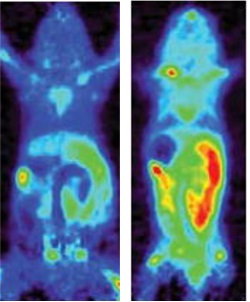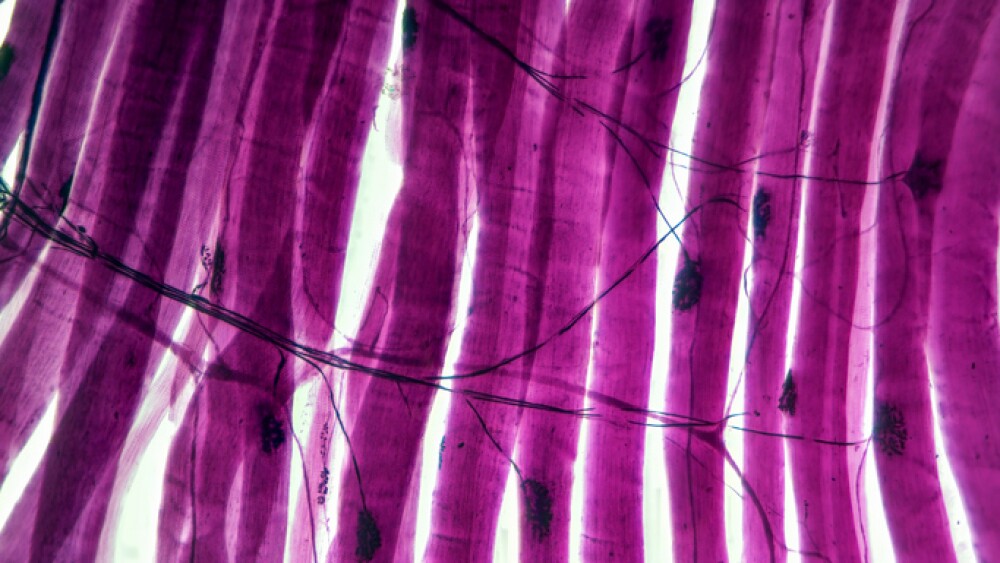LOS ANGELES, Jan. 15, 2025 (GLOBE NEWSWIRE) -- Trethera Corporation (“Trethera”), a clinical stage biopharmaceutical company committed to developing novel drugs targeting nucleotide metabolism for the treatment of cancer and autoimmune diseases, announces an upcoming poster presentation at the Crohn’s & Colitis Congress (CCC) Annual Meeting. Drs. Peter M. Clark, of the University of California Los Angeles, and Kenneth A. Schultz, of Trethera, will present preclinical research highlighting the use of Trethera’s deoxycytidine kinase (dCK) inhibitor, TRE-515, that suggests a functional role for nucleoside salvage and dCK in inflammatory bowel disease (IBD) mouse models.

Figure 1: Representative H&E sections of intestinal tissue from an IBD mouse model without drug treatment showing a high degree of inflammatory cell activity (left) and with TRE-515 treatment with significantly less inflammation (right).
Targeting dCK with first-in-class inhibitor TRE-515 is shown to block symptoms in an IBD mouse model by specifically limiting activated CD4 T cell proliferation. The CCC meeting is a specialized gathering of translational science experts highlighting notable, novel and rigorous scientific discoveries made in IBD that advance understanding of the clinical care of patients. TRE-515 is currently being evaluated in a Phase 1 dose escalation trial treating solid tumors.
Presentation Details:
- Poster Title: First-in-Class Clinical Stage Deoxycytidine Kinase Inhibitor TRE-515 Blocks Inflammatory Bowel Disease in an Adoptive CD4 Cell Transfer Mouse Model
- Authors: Peter M. Clark, PhD; Kenneth A. Schultz, MD; K.M. Ryan, BS
- Poster Session: Congress Exhibit and Poster Hall Reception
- Date: Friday, February 7, 2025; 5PM – 6:30PM
- Location: Congress Exhibit Hall, The Moscone Center in San Francisco, CA
TRE-515 is an orally delivered first-in-class therapeutic engineered to inhibit dCK, the key enzyme in the nucleoside salvage pathway. A common characteristic of IBD is the aberrant proliferation of T and B cells that mistakenly recognize and attack intestinal cells in response to changes in gut bacteria. The abnormal clonal expansion of T and B cells during autoimmunity requires elevated levels of nucleotides – including those provided by nucleoside salvage and dCK – to support rapid cellular DNA replication necessary for accelerated division. In contrast, dCK activity is highly restricted in healthy adult human cells.
By targeting dCK, scientists hope to selectively and effectively deprive abnormally activated immune cells of this needed nucleotide source, thereby ameliorating IBD progression and blocking symptoms of Crohn’s disease. Likewise, cancer cells have the capability to upregulate dCK to increase the intracellular nucleotide pool providing the basic DNA precursors for rapid growth and cancer cell division. This CCC presentation builds on the research work first described in the journal Immunology by Chen et al. in 2023 (PMID: 35986643).

Figure 2. PET scan images showing presence of target enzyme dCK in a normal mouse (left), and one with Crohn’s disease (right).
Sources: NEnglJMed.2020 Dec 31;383(27); Lancet.2017 Apr 29;389; Gastro.2010 Apr138.
About Trethera
Trethera is a clinical stage, privately held, biopharmaceutical company dedicated to pioneering the development of novel treatments for autoimmune diseases and cancers. Founded by prominent UCLA scientists, Trethera is led by experienced management and board members. Trethera's innovative approach to targeting nucleotide metabolism led to the development of TRE-515, an orally administered capsule twice designated by the FDA as an Orphan Drug. TRE-515 is a first-in-class clinical stage drug that inhibits deoxycytidine kinase (dCK), the rate-limiting enzyme in the nucleoside salvage pathway, one of two biosynthetic pathways that generate DNA precursors. It is believed that some forms of cancer may be preferentially dependent on the salvage pathway to support tumor growth, and certain autoimmune diseases might also respond to TRE-515 treatment. Trethera is developing TRE-515 for use as a monotherapy or in combination to precisely target a metabolic vulnerability of cancer or autoimmune diseases that will transform outcomes for patients.
For more information, please visit us at trethera.com or e-mail Investor Relations at ir@trethera.com.
About Inflammatory Bowel Disease
There are two major types of inflammatory bowel diseases, Crohn’s and ulcerative colitis. Crohn’s affects over 1 million Americans and has a high unmet medical need. Patients experience relapsing flares of disease activity that can cause fistulas and strictures, and an increased risk of colorectal cancer that can degrade quality of life. With its discontinuous areas of inflammation, Crohn’s is generally not curable with surgery and so requires systemic drug therapies. Crohn’s is driven by autoreactive CD4 T cells that target antigens in the gut with the involvement of additional immune cell types including macrophages and autoreactive B cells.
Note on Forward-Looking Statements
All statements other than statements of historical facts included in this press release that address activities, events or developments that Trethera believes or anticipates will or may occur in the future are “forward-looking statements,” which may often, but not always, be identified by the use of such words as "may," "might," "will," "will likely result," "would," "should," "estimate," "plan," "project," "forecast," "intend," "expect," "anticipate," "believe," "seek," "continue," "target" or the negative of such terms or other similar expressions. Although Trethera has a reasonable basis for the forward-looking statements contained herein, Trethera cautions that such statements are based on current expectations about future events and are subject to risks, uncertainties and factors relating to medical and scientific research, all of which are difficult to predict and many of which are beyond Trethera’s control, that may cause actual results to differ materially from those expressed or implied by the forward-looking statements in this press release. These potential risks and uncertainties include, without limitation: the extent to which development of any novel cancer therapies or therapies for autoimmune diseases succeeds; whether Trethera would obtain the necessary regulatory approvals to commence human trials or commercialize TRE-515 or any novel therapies resulting from such research; Trethera successfully implementing its growth strategy, including that relating to its disease therapies; the effects of the global Covid-19 pandemic; changes in economic conditions; competition; and risks and uncertainties applicable to the business of Trethera. The statements in this press release speak only as of the date hereof and Trethera does not undertake any obligation to update, amend or clarify these forward-looking statements whether as a result of new information, future events or otherwise. The Company intends that all forward-looking statements be subject to the safe-harbor provisions of the Private Securities Litigation Reform Act of 1995.
Photos accompanying this announcement are available at:
https://www.globenewswire.com/NewsRoom/AttachmentNg/87b2176f-239e-4509-bd09-739937c7950c
https://www.globenewswire.com/NewsRoom/AttachmentNg/198663cb-5785-4f20-aa4d-fad689be8641





